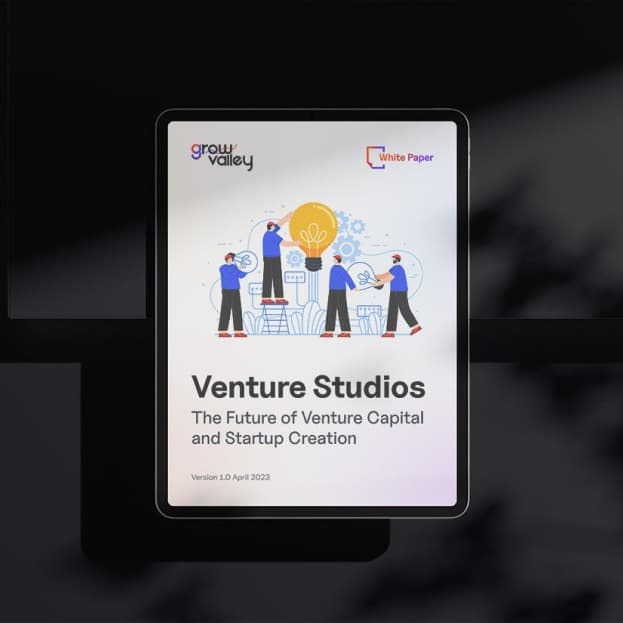Venture Studios: The Future of Venture Capital and Startup Creation


To support these startups, a dynamic and interconnected ecosystem has flourished, with a diverse array of players providing financial resources, guidance, and connections. Venture capital firms, accelerators, and incubators are among the key players in this ecosystem. In addition, incumbents have experimented with different models to avoid being left behind, leading to the emergence of the “venture studio” model.
What is a Public-
Private Venture Studio?

WHITE PAPER
Growvalley
Growvalley
In recent years, advanced technology startups have disrupted traditional business models and ousted established players. To support these startups, a dynamic and interconnected ecosystem has flourished, with a diverse array of players providing financial resources, guidance, and connections. Venture capital firms, accelerators, and incubators are among the key players in this ecosystem. In addition, incumbents have experimented with different models to avoid being left behind, leading to the emergence of the “venture studio” model.
Although venture capital has been around for centuries, the institutional venture capital industry that we see today can be attributed to Harvard
Business School Professor Georges Doriot, who founded the American Research & Development Corporation in 1946. Over time, venture capital firms have been joined by incubators and accelerators to support rapidly expanding technology startups. These firms differentiate themselves by focusing on different funding stages, sectors, or geographies, or by outdoing their peers in activities such as offering better terms or having a broader network. However, in a world where capital is abundant and investors are developing an appetite for riskier bets, this approach is no longer effective. The success rate of startups and venture capital funds is very low, with
only 0.1% of startups and 10% of VC funds considered successful.
To adapt to these changing times, some venture capital firms are thinking strategically and doing activities their competitors are not. Investors are increasingly supplementing financial capital with human capital, to support and educate less experienced founders. One notable example is Andreessen Horowitz (A16Z), which is transforming from a venture capital firm into a venture corporation by building a new type of company with a thick management layer that supports its portfolio companies with marketing, legal, lobbying, and technical resources.
Despite these transformations, entrepreneurship remains a notoriously risky and difficult endeavour, with only a small percentage of startups ever reaching sustained success. The search for the perfect founding team remains elusive, and many investors suffer from decision biases due to noisy
deal flow. With the competition to become the trusted partner of top founding teams growing more intense, some players are now asking, “What if
instead of just supporting founding teams, we build them ourselves?” This led to the emergence of the venture studio model, with firms seeking to stand out and increase their success rate by building new technology ventures themselves.
The origin of this model can be traced back to the practices of risk-takers from centuries ago, and it has since matured into a key player in the entrepreneurial ecosystem. Idealab, regarded as the first venture studio, was launched in 1996. The next wave of larger, Idealab-inspired Venture Studios
didn’t come until years later, with Betaworks and Rocket Internet starting in 2007. Many others soon followed.
Today, there are over 720 venture studios worldwide, with half located in Europe. In both North America and Europe, many venture studios in non-major cities are funded by government agencies to stimulate local growth, sometimes with matching donations from companies. These studios have different metrics than Venture Studios whose limited partners are private family offices or venture capitalists6. They are a novel way to build startups, develop venture ideas internally, conduct initial testing, build early MVPs, hire the founding team, and even provide subsequent funding. Whereas traditional startup founding may look like an individual entrepreneur focused on developing a single idea, venture studios instead aim to build at scale.
This white paper provides a comprehensive analysis of the venture studio model, highlighting its key operational elements and distinguishing it from
other ecosystem enablers. By delving deeper into the venture studio model, readers will gain a thorough understanding of its potential to transform the
entrepreneurial landscape. Through this exploration, we aim to demonstrate the effectiveness of the venture studio model and showcase how it can serve as a game-changing innovation engine.
Continue Reading